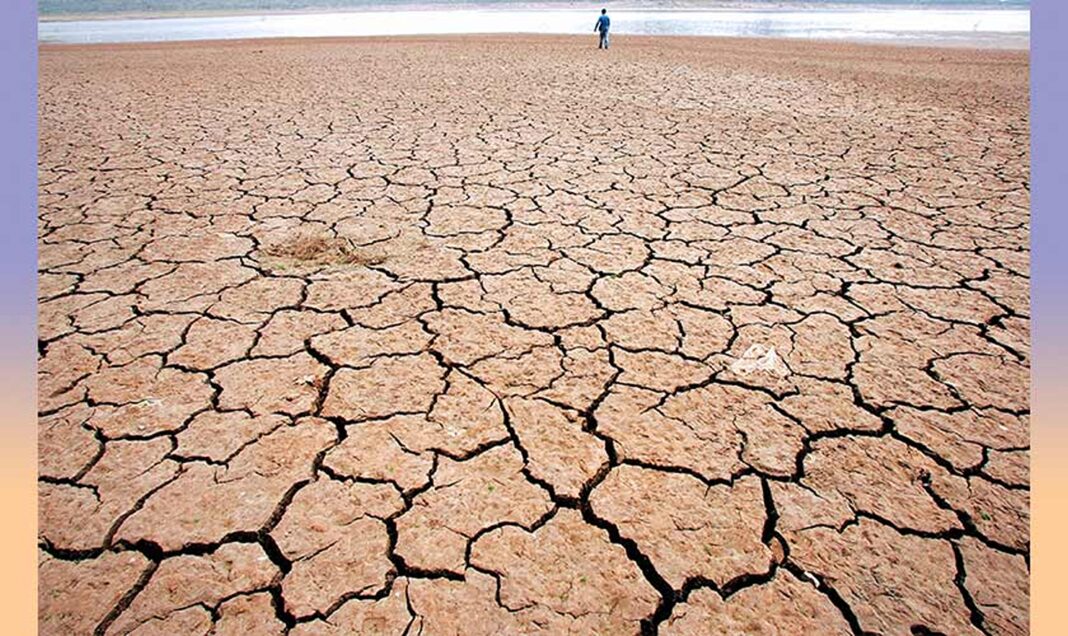Climate change is a present crisis for underdeveloped countries like Pakistan. It directly affects Pakistan’s economy and creates uncertainty for overall growth. Factors like temperature rise, unsmooth weather patterns, floods, increase in energy demands, and heatwaves contribute to environmental problems and have economic consequences. Pakistan’s agriculture and energy sectors, and industry, are stressed out due to an unstable economy.
Unfortunately, Pakistan received $1-2 billion annually to cope with climate change and mitigation. Pakistan’s energy conversion alone costs $100 billion. Still, there are problems with the global climate funding mechanism. Prime Minister of Pakistan appealed to the foreign authorities for financial assistance to cope with the environmental challenges during the World Government Summit in the UAE on February 17, 2025. According to The World Bank, floods of 2022 caused a loss of about $30 billion and put a heavy toll on its economy.
The contribution of the agriculture sector of Pakistan is about 21.9 % to its GDP, with employing 45% of the workforce. According to Frontiers in Environmental Science, Pakistan’s GDP will drop by $19.5 billion by 2050 as an outcome of reduced wheat and rice crop yields.
The intersection of climate change and energy insecurity will push Pakistan into deeper economic distress unless immediate policy shifts prioritize sustainability. ~ Adil Najam
Pakistan’s main water supply, the Indus River System, is dependent on glacier drainage. Rising temperature leads glaciers to melt down quickly, rendering water more limited and exposing agriculture to further risk. Bearing in mind that Pakistan’s energy sector is wholly dependent on hydropower generation, which is about 30% of electricity supply as a whole.
Michael Kugelman is working as a deputy director of the Asia Research Program at the Wilson International Center for Scholars, he speaks about the origins of energy problems in Pakistan, “An acute ongoing energy crisis poses serious threats to Pakistan’s feeble economy and national security environment”.

Above highlighted unpredictable rainfall weather situations affecting the flow of rivers and dams, and also an increase in melting glaciers is a big reason for lowering the water availability in recent times. Consequently, Pakistan continues to rely extensively on fossil fuel imports. Economic instability has been made worse by alterations to global energy prices as well as increased demand pushed on by climate change.
Pakistan Meteorological Department (PMD) has recently issued a warning about the reduction of hydropower sector performance as a consequence of melting a huge amount of glaciers due to extreme heatwaves. National Electric Power Regulatory Authority (NEPRA) reported the high summer demands have increased by 7-10 % annually. In Pakistan Economic Survey 2023, experts expressed that only in 2023 Pakistan spent about $15 billion on importing fuels for the energy sector.
Power stations, cables for transmission, and power distribution networks undergo damage from violent weather events, which raises repairs expenses and causes shortages of energy. According to the Asian Development Bank (ADB), by 2050, the yearly losses to the energy industry from disasters caused by climate change may surpass $2 billion. Also, a report from ADB till year 2023 is attached below, where the GDP growth was declined to 3.5%.
Dr. Adil Najam, a Professor of International Relations and Earth & Environment in Pardee School of Boston University says: “The intersection of climate change and energy insecurity will push Pakistan into deeper economic distress unless immediate policy shifts prioritize sustainability.”
Dr. Abdul Sattar Nizami is working as an Associate Professor at Sustainable Development Study Centre at Government College University, Lahore. In a conversation with Dr. Nizami, he said that Pakistan must move on converting solid waste into energy.
According to Dr. Nizami, natural zeolite and black lava (basaltic rocks) are the ingredients that have inherent characteristics for waste to energy production. Dr. Nizami’s solid waste group has successfully converted plastic waste into liquid fuel and valuable char using a small-scale pilot pyrolysis reactor. The liquid fuel is then utilized as a renewable energy resource for the future.
For the future, to create financially viable climate initiatives, Pakistan must further develop its institutional ability at home. Strategies that may bring in private as well as public capital are necessary for implementing our promise to generate renewable energy by 2030 and switching to electric cars.
It is crucial to establish an enabling regulatory framework through public-private partnerships, required climate risk reports, as well as customized incentives. Pakistan must also put a high priority on financial innovation by developing adaptive insurance plans, green bonds, and hybrid financial models. Effective use of the funds will depend on establishing deep expertise in climate finance and technology and fostering collaboration between both the national and provincial levels.
Reference:
- https://www.thenews.com.pk/tns/detail/1006921-climate-change-and-pakistans-economy
- Fahad, S., Wang, J. Climate change, vulnerability, and its impacts in rural Pakistan: a review. Environ Sci Pollut Res 27, 1334–1338 (2020). https://doi.org/10.1007/s11356-019-06878-1 (General discussion)
https://www.dawn.com/news/1873074/from-finance-vulnerability-to-green-resilience - Climate funding gap at World Governments Summit in the UAE February 2025 https://www.dawn.com/news/1892482
- Facts about contribution of GDP in importing fuels in 2023 https://nepra.org.pk/publications/Annual%20Reports.php
- https://www.worldbank.org/en/news/press-release/2022/10/28/pakistan-flood-damages-and-economic-losses-over-usd-30-billion-and-reconstruction-needs-over-usd-16-billion-new-assessme
- Michael Kugelman speaks about energy crises in Pakistan https://www.nbr.org/publication/pakistans-energy-crisis/
- Asian Development Bank (ADB) facts https://www.adb.org/news/pakistan-economy-slow-2023-amid-strong-climate-headwinds-adb
- Dr. Adil Najam’s interview https://climate-diplomacy.org/magazine/conflict/security-implications-climate-change-pakistan-interview-adil-najam
- Pakistan’s GDP decline during 2020-2050 https://www.brecorder.com/news/40209561/by-2050-pakistans-annual-gdp-can-decline-18-20-due-to-climate-change-risks-world-bank
More from the author: Is electrical energy an alternative to more carbon footprints?

Mr. M. Kashif Raza is a Physics undergrad at the institute of Physics, GC University Lahore. He’s Scientia’s Intern (Cohort-2) and a regular writer in Scientia Mag. Currently serving as a RA intern in the Nanotechnology laboratory GCU Lahore. He is working as Science Communicator and Science Writer in different organizations. Furthermore, He will be pursuing his further research at Helmholtz-Zentrum Berlin Institute for Materials & Energy, Germany. He wrote and co-authored a couple of research articles for national and international media in the field of Nanotechnology & Nanoscience.

